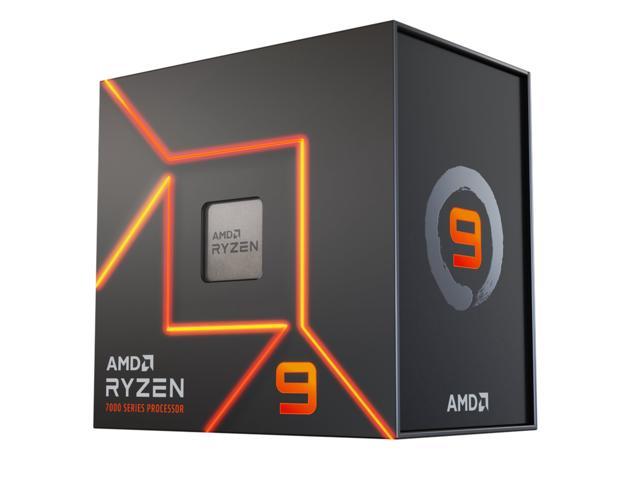Conclusion
In today’s review we have put the new AMD Ryzen 9 7900X through its paces with synthetic benchmarks, system benchmarks, and specific CPU benchmarks, and then threw a bunch of games at it. We tested at 4K, 1440p, and 1080p for the full gameplay experience that each CPU provides, using a fast GeForce RTX 3090 Ti FE video card.
The AMD Ryzen 9 7900X is a new $549.99 12-core/24-thread CPU from AMD that can boost to 5.6GHz, replacing the previous Ryzen 9 5900X. The new Ryzen 7000 series CPUs are based on the new Zen 4 architecture on a 5nm TSMC process. These new CPUs usher in a brand new platform from AMD to base this generation, and future generations off of. We have PCI-Express 5.0 support, DDR5 memory support, new chipsets like X670E, and a new AM5 LGA1718 socket with higher power delivery. All of these platform choices push the industry forward and will keep future generations marching forward.
Performance
Starting with the system benchmarks, and PCMark 10 we found the AMD Ryzen 9 7900X to top the charts, besting the Intel Core i9-12900K and being 15% better than the last generation 5900X. In the application testing, which is very telling of office performance using Microsoft Office, the Ryzen 9 7900X was exceptionally fast, beating the previous 5900X by 22% and beating the i9-12900K by 9%. The system performance testing continued in Geekbench 5 where the Ryzen 9 7900X was 55% faster than the previous generation 5900X and 4% faster than the Core i9-12900K. In single-core testing, this lead continued and the Ryzen 9 7900X was 30% faster than the 5900X and 12% faster than the i9-12900K.
Next, we moved on to specific CPU testing in AIDA64. In the PhotoWorxx test, we found the Ryzen 9 7900X to outperform the previous generation 5900X by a massive 77%. However, the Intel Core i9-12900K bested the 7900X by 41%. In the CPU AES testing, the Ryzen 9 7900X was the fastest CPU on the block and beat the 5900X by 34% and the i9-12900K. In CPU SHA3 the Ryzen 9 7900X gave the rest of the CPUs a good beating. It was 50% faster than the 5900X and 33% faster than the Core i9-12900K. In FPU testing the Ryzen 9 7900X continued to dominate in Julia and Mandel offering over 50% more performance than the Core i9-12900K.
We also specifically looked at memory bandwidth. Our findings are that the AMD Ryzen 7900X has a greater write speed than it does memory speed in terms of bandwidth. We found that memory write was 78GB/s while read was 74GB/s. These are massive gains over the AM4 platform. However, interestingly, using the same exact ram, frequency, and timings the Alder Lake platform consistently had higher memory bandwidth, upwards of 90GB/s. This isn’t a latency issue either, as latency on the AMD Ryzen 9 7900X is very good at 63.7ns. It’s very close to DDR4 latencies and has the best latency with DDR5 in fact. The Alder Lake CPUs and platform seemed to have the highest latency overall.
Moving on to rendering performance in Cinbench R23 the AMD Ryzen 9 7900X dominated all the other CPUs in performance improvements, including the higher core count ones like the 5950X. It was 37% above the 5900X and 10% faster than the Core i9-12900K. In single-core rendering, the Ryzen 9 7900X once again dominated with higher performance than the Core i9-12900K. This trend continued in all three Blender render tests. The Ryzen 9 7900X was faster than the Intel Core i9-12900K by 15-16% and faster than the 5900X by 35-41%. In V-RAY 5 the Ryzen 9 7900X dominated by being 21% faster than the Core i9-12900K and 39% faster than the 5900X. Finally, in HandBrake the new Ryzen 9 7900X greatly improved transcode/encoding performance in video rendering. It brought performance up to equal the Intel Core i9-12900K and improved a lot over the Ryzen 5000 series.
Now we move on to gaming, and let’s just say unless you are playing Microsoft Flight Sim 2020, everything else at 4K is GPU bound even with a GeForce RTX 3090 Ti FE. However, we did experience that at 1440p the CPU can provide a performance uplift in performance. Naturally, the greatest differences were at 1080p.
In F1 2022 the Ryzen 9 7900X improved performance over the 5900X by 3-5%. In Dying Light 2 the Ryzen 9 7900X improved performance over the 5900X by 4%. In Far Cry 6 the Ryzen 9 7900X improved performance over the 5900X by 3-17% from 1440p to 1080p. In Watch Dogs Legion the Ryzen 9 7900X improved performance over the 5900X by 10%. In Cyberpunk 2077 the Ryzen 9 7900X improved performance over the 5900X by 8-10%. In Microsoft Flight Simulator 202o the Ryzen 9 7900X improved performance over the 5900X by 18-32%. In Crysis Remastered the Ryzen 9 7900X improved performance over the 5900X by 2-12%. Finally, in Shadow of the Tomb Raider, the Ryzen 9 7900X improved over the 5900X by 14%.
Power and Temp Discussion
There is no question that power has increased this generation on AMD Ryzen 7000 series. AMD has increased the TDP to 170W on the Ryzen 9 7900X versus 105W on the Ryzen 9 5900X. In addition, the TDP is not the maximum Wattage, it is just an indicator. The actual SOC power from the socket can and will be higher, potentially up to 230W for this CPU. However, in our testing it did not climb that high, staying at around 200W when fully loaded. When compared to the Intel Core i9-12900K at 242W, we find the AMD Ryzen 9 7900X to be a more performance to power efficient CPU.
AMD is utilizing a higher power curve this generation, and that does allow higher frequencies to be maintained. We experienced the full boost clock speed of the CPU while gaming, and on all cores it was around 5.1-5.2GHz across all cores at full tilt. This is still above 5GHz, and that is the fact, we are finally able to sustain above 5GHz this generation.
The TjMax temperature that these CPUs can run at safely 24/7 is 95c. The CPU will try to reach this thermal limit, and it will not throttle. You will most likely hit a thermal wall before you hit a power wall. Our CPU only hit close to 92c at full tilt. Therefore it did stay under the 95c temperature, and thus was performing at the top of its game. In addition, the power and temperature of the CPU are much lower when you are not running it fully loaded, like in gaming. When you are gaming the power and temperature are much much lower.
Final Points
In our benchmarks you often saw the AMD Ryzen 9 7900X topping the charts in performance, dominating the other CPUs, even CPUs with more cores. This is a testament to the performance of the Ryzen 9 7900X. In our synthetic benchmark test, we found it to be a top performer, and CPU-specific testing has some massive gains over the previous generation for certain tasks and workloads. If you are in an office type of environment, it really does boost office and productivity performance.
If you are performing CPU-specific workloads like encryption, or FPU data crunching, the Ryzen 9 7900X will provide big gains from the last generation. We also found the Ryzen 9 7900X to do very well in creating content like 3D rendering and video encoding performance. It was the fastest in Cinebench R23, V-RAY, Blender, and a growing segment, video transcoding/encoding performance.
In terms of gaming, if you are GPU bound, which is going to be 4K, the CPU won’t make a huge difference here. However, for 1440p and 1080p gaming, it can most certainly affect your gaming performance. There are some games that are more CPU dependent than others, like Far Cry 6 and MS Flight Sim 2020. In these games the Ryzen 9 7900X improved performance a lot over the previous generation. What it comes down to is what type of GPU you have, and what is your native resolution you play at.
Another thing to consider is if you use DLSS or FSR. Enabling these features can make you more CPU limited in a game since it is running at a true lower resolution, and then upscaling. Therefore the more powerful Zen 4 architecture in gaming here could provide a bigger benefit. If you find yourself using DLSS and FSR a lot in games, a faster CPU is going to help more in that scenario.
We do have to mention though how close, or better, the Intel Alder Lake CPUs still are in gaming. Though the Ryzen 9 7900X has improved performance over the previous generation, we still find that overall an Intel Core i9-12900K mostly provides even higher performance at those lower resolutions. It still has the overall advantage, as slight as it is, except for Microsoft Flight Sim 2020 where the Ryzen 7000 series reigns currently. We do have to mention this fact because Ryzen 9 7900X is only bringing performance up to, or parallel with, Alder Lake gaming performance, it isn’t surpassing it for the most part. It’s not a clear win for the 7900X here against the 12900K in gaming.
At the end of the day, one must realize that the Zen 4 architecture, the AMD Ryzen 7000 CPU series, is about evolving the Zen 3 architecture. It’s not about redefining it. The goal of this generation was to increase core clock frequencies. AMD has fully and successfully achieved this, and more.
The AMD Ryzen 9 7900X, a 12-core CPU, can sustain above 5GHz on all cores at full tilt. When not stressing the CPU to its max, it can boost to 5.6GHz and you will see this while gaming. In addition, AMD has increased IPC along the way with L2 Cache increases and front-end improvements. Plus AMD has shrunk the CPU to a new 5nm node, shrunk the IOD to 6nm, and included RDNA2 integrated graphics CUs on board for onboard video. All of this while at the same time supporting new DDR5 memory, PCI-Express 5.0, and a new socket AM5 as well as new chipsets.
The AMD Ryzen 9 7900X is impressive from a performance per Watt perspective, especially versus the competition, and comes in at an appealing price point. If you need a CPU upgrade for the next generation, this is the sweet spot in our opinion.





